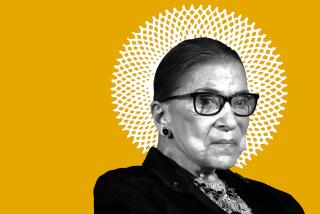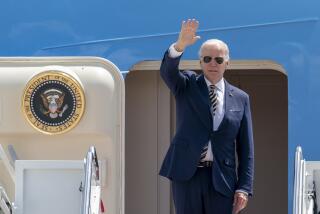As Asia Goes, So Goes Rubin’s Name
- Share via
Were the condition of the U.S. economy today nearly as troubled as Asia’s, Americans would be looking for people to hang. Robert E. Rubin’s name would be, if not mud, then, surely, no better than that of Ryutaro Hashimoto, the fallen Japanese prime minister. But with the U.S. economy in its seventh consecutive year of boom, why isn’t the U.S. Treasury secretary the happiest soul on the planet? It’s because the final chapter of Clinton’s run has yet to be written. This administration’s unraveling, if it doesn’t happen with an impeachment, could come because of Asia, whose miseries are beginning to wash up on American shores. Last week, as the news surfaced in Washington that U.S. economic growth had dropped to 1.4% in the second quarter, after a buoyant 5.5% in the first, the most pointed comments by Rubin during a conversation I had with him were about China and Japan. No surprise: Asia will not be able to emerge from its stomach-wrenching tailspin if either Beijing or Tokyo responds to this historic crisis ineptly or parochially.
In Asia, Rubin’s public critiques of Japan are the stuff of legend and his June meeting with China’s economic czar Zhu Rongji was covered like a papal visit. His words on U.S. economic policy are weighed and analyzed abroad as if they were gold. Rubin, the Wall Street multimillionaire, is widely regarded in Asia as the world’s second most powerful official, after Clinton. Rubin is extraordinarily loyal to his boss, but he is under family pressure to return to New York. Asked if he had become bleak about Asia’s prospects, he replies by admitting only to “concern.” But there’s concern, and there’s concern: He’s well aware that Chinese export sales in Asia have plummeted, that overall mainland growth looks to be sagging below the 8% annual target set by Beijing and that in Shanghai, China’s sprawling metropolis, the office vacancy rate is so high that no Chinese official will publicly proffer the true, undoubtedly stratospheric figure. Yet, having met Zhu face-to-face, Rubin expresses a bit more than idle hope that China will hang tough and that a currency devaluation will not be automatic even if the yen continues to sink. “Japan affects all the world,” he sighs, “but when I was in China, they expressed their determination to proceed on the basis of their self-interest and maintain the [Chinese currency].”
While he takes some comfort from that, Rubin is not a man who became a roaring success by kidding himself. His concern about Asia becomes palpably immense irritation when the topic turns to Japan. And if his attacks on Tokyo are perceived in many parts of Asia as all-too-typical exemplars of American arrogance, it must be conceded that Rubin’s management of the U.S. economy, in tandem with Federal Reserve Chairman Alan Greenspan, has been more adroit than that of the half-dozen successive failed Japanese prime ministers with whom both he and his boss Clinton have had to wrestle since the 1992 election. When asked if Washington’s public posture toward Tokyo might come up disagreeably short in the suavity department (in Japan, Rubin is sometimes ruefully described as a “megaphone” diplomat), Rubin pauses for a few tense seconds before answering: “What happens in Japan is critical to what happens in Asia and the rest of the world. Yes, the U.S. has been rightly focusing on [Japan], but so has the rest of the world. Japan has needed to act decisively all along. I have felt this way a long time. They need to act quickly and effectively.”
It’s easy to understand the irritability. The Japanese have been difficult and even wrong. But U.S. policy in Asia has not been without missteps; if there is an Achilles’ heel, it is that Clinton and Rubin have relied on the International Monetary Fund to a fault. Asked if he agrees that IMF performance has been very mixed, at best, Rubin says no: “These are unprecedented and complex issues. Many countries are in trouble all at the same time; there are problems in each one which affect the other countries. Japan is the second largest economy and by many multiples the largest in the region. The IMF has done a good job. It’s easy to be a critic, but there are no easy solutions. The best argument for the IMF? It’s the possibility of a substantial escalation [of the crisis]--that is a real possibility. It would have a severe impact on the U.S. The IMF is a core institution that responds to protect the global economy and our financial concerns.” Rubin believes Congress will ultimately authorize all that the administration has asked in additional IMF funding: “The U.S. agricultural community is beginning to get behind it. The American people are beginning to see how our world economy really is.” He has to fight for the funds: For all the U.S. overreliance on it, the IMF is just about all Asia has right now. There’s not much else to brace the fall.
Rubin knows that, while it’s possible that the future of the Clinton presidency will hinge on a grand jury finding or a congressional impeachment proceeding, it could also come unglued over Asia--and it’s Rubin’s job to reduce the odds of the second happening. There is absolutely nothing he can do about the first. There is only so much he can do about the second.
More to Read
Inside the business of entertainment
The Wide Shot brings you news, analysis and insights on everything from streaming wars to production — and what it all means for the future.
You may occasionally receive promotional content from the Los Angeles Times.










